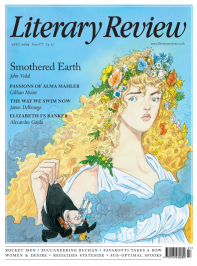Paul Binding
Under the Heel
The Warlow Experiment
By Alix Nathan
Serpent’s Tail 278pp £12.99
An investigation into the ‘resilience of the human mind without society’, Herbert Powyss decides early in 1793, will make a significant contribution to human knowledge – one which will impress the renowned Royal Society in London, to whom he has already submitted papers on horticultural matters. As a Herefordshire landowner familiar with radical movements in the sciences and social politics, as well as a well-off bachelor with no distracting attachments, Powyss is ideally placed to conduct such research. Below the kitchen basement of his inherited manor house lie yet older cellars with thick stone walls. He has three rooms here repainted and refurbished with choice items of contemporary culture. The subject of his inquiry will live down there in solitude for seven years. He must live ‘naturally’ – no cutting of hair and nails, for example. But every day dishes of food (and very good food too) and a chamber pot will be sent down to him in a specially constructed lift. In return, the man will receive £50 every year for the rest of his life and his dependants will be satisfactorily provided for.
What kind of man would assent to such severe, life changing conditions? A poor one obviously. John Warlow, the sole applicant, is a local dissatisfied agricultural labourer whose wife, Hannah, means little to him, either personally or sexually. As for his six children, with the exception of his

Sign Up to our newsletter
Receive free articles, highlights from the archive, news, details of prizes, and much more.@Lit_Review
Follow Literary Review on Twitter
Twitter Feed
It wasn’t until 1825 that Pepys’s diary became available for the first time. How it was eventually decrypted and published is a story of subterfuge and duplicity.
Kate Loveman tells the tale.
Kate Loveman - Publishing Pepys
Kate Loveman: Publishing Pepys
literaryreview.co.uk
Arthur Christopher Benson was a pillar of the Edwardian establishment. He was supremely well connected. As his newly published diaries reveal, he was also riotously indiscreet.
Piers Brendon compares Benson’s journals to others from the 20th century.
Piers Brendon - Land of Dopes & Tories
Piers Brendon: Land of Dopes & Tories - The Benson Diaries: Selections from the Diary of Arthur Christopher Benson by Eamon Duffy & Ronald Hyam (edd)
literaryreview.co.uk
Of the siblings Gwen and Augustus John, it is Augustus who has commanded most attention from collectors and connoisseurs.
Was he really the finer artist, asks Tanya Harrod, or is it time Gwen emerged from her brother’s shadow?
Tanya Harrod - Cut from the Same Canvas
Tanya Harrod: Cut from the Same Canvas - Artists, Siblings, Visionaries: The Lives and Loves of Gwen and Augustus John by Judith Mackrell
literaryreview.co.uk